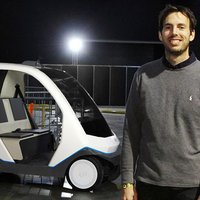Sixty years after Sputnik blasted into space, escaping our atmosphere remains absurdly expensive. Lars Blackmore, an engineer at SpaceX, is working on changing that with rockets that could be flown back to Earth in reverse.
As things stand, every time a space rocket takes off and releases its payload, it breaks up and falls into the ocean. “It’s basically like flying a 747 across the country and then, instead of refueling it, throwing it away,” says Blackmore, a soft-spoken Brit who leads a team at SpaceX that’s developing the onboard software necessary for a rocket to come down gently in an upright position onto a platform in the ocean.
SpaceX has come agonizingly close to sticking a rocket landing several times, but it didn’t get a chance to try again in its most recent flight, when the Falcon 9 rocket exploded during takeoff.
Landing a rocket backwards is an insane trick. The descent is extraordinarily unpredictable, and rockets aren’t meant to travel in reverse, so it requires extremely fine control over the boosters and guidance fins. Blackmore has devised algorithms to enable a rocket’s onboard computer to deal with this chaotic situation while safely controlling the craft’s fall.
If the feat can be perfected, it would change the economics of space travel entirely. Fuel accounts for less than half of 1 percent of the cost of a rocket launch, so refurbishing a rocket would make the next launch considerably cheaper. How much cheaper would depend on how well the booster could be reconditioned following the extreme stress of takeoff.
Blackmore grew up dreaming of working at NASA Mission Control. After a PhD at MIT, he joined NASA’s Jet Propulsion Lab, where he worked on precision landing systems and a climate probe called SMAP. He went to SpaceX in 2011. “I’d heard that Elon [Musk] had these dreams of making reusable rockets,” Blackmore says. “And since I was working on precision landing for Mars, I thought I would be the right guy to do that.”
Would he want to go back to NASA someday? “When you hear about the Apollo program in its heyday, it was a bunch of young kids, and no one told them what they could do,” he says. “That is exactly what I’ve found at SpaceX.”
—Will Knight
Watch this Innovator at EmTech 2015
Meet the Innovators Under 35




